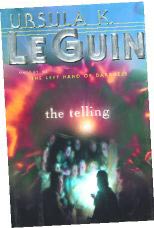Ah, dystopia. In the Corporation State of Aka, life is a dreary haul for the “producer-consumers” who populate its drab cities. The ultrama- terialist Corporation State of Aka is on a glorious mission of technological progress, and there is no time to waste. Producer-consumers gulp cups of “Starbrew” between long hours at the office and gym. If there were roses on Aka, no one would stop to sniff them. Ursula K. Le Guin’s latest science-fiction novel, the telling, takes place on a world that combines some of the worst features of postwar China and the corporation-dominated United States with touches of 1984.
The Telling
by Ursula K. Le Guin (Harcourt, $27.50)
From Le Guin, a writer whose forte is the ambiguous utopia—the “ideal” world complicated by paradox and thoroughly imagined, messily human detail—Aka is an unusually simple hell. Eager to “march to the stars,” the Akan government has banned not only the planet’s traditional literature but its language, too, replacing it with a Newspeak of exhortations. In place of the arts, Akans watch videos of schoolchildren singing state songs. The past has been outlawed, and the present is lived in an amnesiac fog of overwork and infotainment. The gadgets everyone’s working so hard to make are crappy. The food is Franken. And as if this weren’t enough horror for one novel, the protagonist—a lesbian earthling named Sutty—has come to Aka to escape book-burning fundamentalists at home.
Le Guin fans will recognize Sutty’s type: She’s a representative of the Ekumen, a kind of interstellar United Nations—an entity less bureaucratic and more soulful than Star Trek‘s Federation. (This book takes place in the Hainish universe where Le Guin set 1969’s The Left Hand of Darkness and several other novels and stories which are not otherwise connected.) Sutty is a linguist who’s spent years preparing to study and record Aka’s rich literature for the Ekumen. But space travel takes a long time in planet-surface years, and by the time Sutty arrives, Aka is busily burning its own books, trying to wipe out the “rotten corpses” of its mytho- poetic past. The obvious historical parallel here is Mao’s suppression of Taoism and Buddhism.
The allegory is almost too transparent. Like many a West Coast malcontent before her (she’s from Vancouver), Sutty is alienated by her home world’s dominant culture, and she yearns for alternatives. She loves Aka’s poetry because it suggests to her a culture with egalitarian values, one that appreciates yin as well as yang (or, in Akan metaphor, both forks in the trunk of the Tree). She comes to Aka hoping to find a utopia, but instead she finds a paradox: A society that tries to obliterate religion in the name of economic progress behaves in some ways like a society ruled by religious extremists.
Luckily for Sutty, this isn’t the end of the story. She falls in with a thriving subculture of Akans who do their best to keep the old stories alive. Their literature is only part of a philosophical system called “the telling.” Like Taoism, the telling embraces medicine, movement, and magic as well as poetry. Traditional Akans drink herbal teas and eat carefully prepared vegetables according to season. They practice a kind of tai chi. They see themselves as belonging to a grand balance of life and energy. Their central metaphor is a great Tree whose leaves and branches represent the world itself, and their ritual is storytelling.
When the dissidents invite her on a trek deeper into the mysteries of the telling, Sutty is in heaven. She has a serious crush on their culture. So, clearly, does Le Guin, except that it’s not a crush but a committed love affair. Le Guin’s study of Taoism has informed her work for decades and given her worlds a depth and complexity unusual in science fiction.
Oddly enough, Le Guin seems to have trouble imagining real complexity in the practice of the telling itself. She breaks the novelist’s cardinal rule and tells us about the telling instead of showing it. We see the ancient Akan culture mainly through Sutty’s enthusiastic notes on its literature and customs. Of all its fabled stories, we hear only one.
Because they are handled so reverently and because of their tendency to “sing one song in many voices,” the traditional Akans don’t come alive as individuals. During Sutty’s long journey with the dissidents, I felt as if I were on a forced march with a dozen Yodas and one cheerleader.
The novel gets back on track when the conflict sharpens between the Corporation State and the dissidents, leading to an outcome much more interesting than the standard apocalyptic SF climax. Here we see that the opposition between dominant culture and subculture on Aka is not as simple as it first appeared. Le Guin’s writing is deft and graceful throughout the telling, but the closing is especially nice: elegiac, subtle, and satisfyingly ambiguous.







